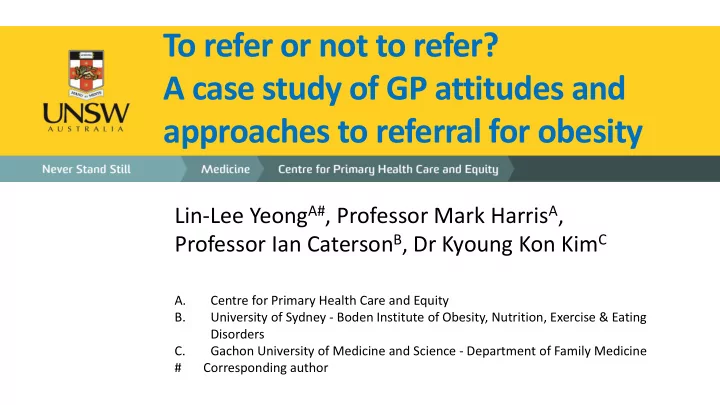

To refer or not to refer? A case study of GP attitudes and approaches to referral for obesity Lin-Lee Yeong A# , Professor Mark Harris A , Professor Ian Caterson B , Dr Kyoung Kon Kim C A. Centre for Primary Health Care and Equity B. University of Sydney - Boden Institute of Obesity, Nutrition, Exercise & Eating Disorders C. Gachon University of Medicine and Science - Department of Family Medicine # Corresponding author
Acknowledgements • COMPaRE-PHC Team • Professor Mark Harris, Dr Caterson and Dr Kim • Medicare Locals and General Practitioners Centre for Primary Health Care and Equity
Introduction • 26.6% of adult patients in general practice are obese 1 • Obesity highest in low SES, Aboriginal and Torres Strait Islanders, born overseas 2 • In 5As, which obese patients to refer, when and to whom is a critical element 3 • Referral for Bariatric Surgery: • BMI >40kg/m 2 or 35 kg/m 2 and co-morbidities 3 • BMI >30 kg/m 2 and poorly controlled T2DM/CVD risk 3 Centre for Primary Health Care and Equity
Rationale • GP referrals happen infrequently 4-5 • Patients seeking non-surgical options are not getting referred 4-5 Morbidly obese man awarded $364, 372 as GP ruled negligent by not referring him to bariatric surgery 6 Centre for Primary Health Care and Equity
Aims • Explore attitudes of GPs towards referring obese patients for bariatric surgery • Identify current approaches of GPs to manage disadvantaged, obese patients Centre for Primary Health Care and Equity
Methodology • Design: Collective Case Study as a part of a study conducted by COMPaRE-PHC in NSW • Setting and Participants: 2 GPs in South West Sydney and 2 GPs in Illawarra-Shoalhaven • Data collected: Semi-structured interviews • interview questions explored GP experiences with referral, influencing factors to refer and costs to patients • Analysis : Thematic qualitative Centre for Primary Health Care and Equity
Demographic Characteristics South West Sydney (SWS) Illawarra-Shoalhaven (IS) Location Dr W Dr X Dr Y Dr Z Age 40-49 40-49 50-59 30-39 Gender Male Male Female Female Practice Size Group e.g 6+ Solo Single Large group Distance from 10km 2km 1km 25 km bariatric surgery Ethnicity of patients Overseas Overseas Australian Australian Socio-economic Status of patients, % private health insurance Medium, 10% Medium, 30% High, 60% Medium, 30% Location of study, yrs in practice, yrs Overseas, 23 , 14 Overseas, 10 , 1.5 Australia, 35 , 30 Australia , 11, 5 in current practice English & English & Language English English Non-English Non-English Centre for Primary Health Care and Equity
Results GPs who feel they have limited GPs who feel they have a options for referral variety of options for referral • Frustrated and negative • Positive attitudes • More likely to refer and attitudes • Less likely to refer recommend surgery • Only referred patients with • Employed empathy • Negotiated with the patient financial means • Prepared patients mentally and physically Centre for Primary Health Care and Equity
Results • Lack of health system resources and cost Centre for Primary Health Care and Equity
Conclusion • GPs are less likely to refer patients if they believe cost is a major barrier • Changing attitudes about the limitations of cost is important • GPs who believe they have more options, are more likely to refer patients to surgery and help patients move past barriers Centre for Primary Health Care and Equity
Implications for Policy and Practice • Make GPs aware of resources available and encouraging referrals • Integrated approach where information from patients, GPs, hospitals and other programs is shared • Continued research is required Centre for Primary Health Care and Equity
Take Home Message Centre for Primary Health Care and Equity
References 1. Britt H, Miller GC, Henderson J, Charles J, Valenti L, Harrison C, Bayram C, Zhang C, Pollack AJ, O’Halloran J, Pan Y. General practice activity in Australia 2011-12. Sydney: Sydney University Press, 2012. 2. Passey ME, Laws RA, Jayasinghe UW, Fanaian M, McKenzie S, Powell-Davies G, Lyle D, Harris MF. . Predictors of primary care referrals to a vascular disease prevention lifestyle program among participants in a cluster randomised trial. BMC Health Serv Res. 2012;12:234. 3. National Health and Medical Research Council (2013) Clinical practice guidelines for the management of overweight and obesity in adults, adolescents and children in Australia. Melbourne: National Health and Medical Research Council. 4. Denney Wilson E, Wan Q, Vagholkar S, Shutze H, Harris MF. Routine assessment and management of lifestyle risk factors in General Practice: Results from two randomised controlled trials" Australian Family Physician 2010; 38: 950-3 5. Harris M. PEP: An intervention to equitably implement guidelines for vascular disease prevention in general practice. 2012 Primary Health Care Research Conference. July 18-20 2012, Canberra 6. Aston, H. 2013. Obese man wins $350,000 payout from GP. Retrieved from http://www.smh.com.au/nsw/obese-man-wins-350000-payout-from-gp-20130207-2e0b6.html#ixzz2PRp3lj6x on February 10 th 2014 Centre for Primary Health Care and Equity
Further Information lin-lee.yeong@student.unsw.edu.au and www. http://compare-phc.unsw.edu.au/ The research reported in this presentation is a project of the Australian Primary Health Care Research Institute which is supported by a grant from the Australian Government Department of Health and Ageing. The information and opinions contained in it do not necessarily reflect the views or policy of the Australian Primary Health Care Research Institute or the Australian Government Department of Health and Ageing. Centre for Primary Health Care and Equity
Questions Centre for Primary Health Care and Equity
Recommend
More recommend